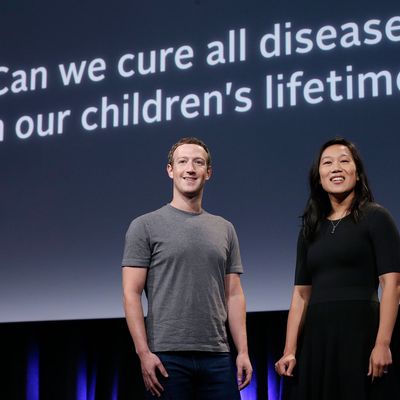
It would be easy, if you just read the first sentence of a USA Today story that went up earlier today, to think the author or an editor had made a silly-sounding error. “Facebook CEO Mark Zuckerberg and his pediatrician wife, Priscilla Chan, are launching an ambitious effort to spend $3 billion over the next decade to cure disease,” writes Jessica Guynn. Wait, but which one?
There’s no error, though. Zuckerberg and Chan want to cure disease, full stop, they announced today at an event put on by their Chan Zuckerberg Initiative. As in, all of the diseases. They plan on launching a $3 billion effort to achieve this goal by the end of the century, in fact, and “[a]s part of the investment, the couple is funding a $600 million research center in San Francisco called the Biohub that is a partnership with UC San Francisco, Stanford University and UC Berkeley. Neurobiologist Cori Bargmann is signing on as the Chan Zuckerberg Initiative’s president of science.” The Biohub will “develop new tools to measure and treat disease … [by] bring[ing] together leading scientists from UC San Francisco, Stanford University and UC Berkeley,” notes Guynn.
“Today, just four kinds of diseases cause the majority of deaths,” Zuckerberg noted in a Facebook post quoted by Guynn. “We can make progress on all of them with the right technology. Throughout history, most scientific breakthroughs have been preceded by the invention of new tools to help us see problems in new ways — like the telescope, the microscope, and DNA sequencing. It’s not hard to imagine the modern tools required to accelerate breakthroughs in today’s four major disease areas. So we’re going to focus on bringing scientists and engineers together to build these new tools and technologies.” Specifically, Guynn writes, Zuckerberg and Chan “called for investments in artificial intelligence to probe the brain, machine learning to explore cancer genomes, computer chips to detect infectious disease and bloodstream monitors to catch diseases.”
There’s of course something gimmicky in making a grand and well-funded call to end as gigantic and seemingly intractable a problem as “disease” in one fell swoop. That’s by design — the goal is for the plan’s audacity to help focus attention on it. And it can only be a good thing when insanely rich people decide to spend massive sums trying to help solve problems with gigantic footprints of death and trauma and tragedy — that’s exactly the sort of philanthropy that should be rewarded and encouraged.
But still, it’s hard not to be just a little bit cynical about this sort of talk, simply given how often we’ve heard from tech titans that more technology can — and will, inevitably — solve just about any problem. This despite the fact that, when it comes to many of the problems tech is now turning its ambitious and money-flushed eyes toward, a lot of brilliant people have been toiling for a long time, with decidedly mixed results. The so-called “war on cancer,” for example, has cost the federal government more than $105 billion since it was launched, in 1971, but hasn’t gotten us all that close to “curing” cancer (though there are some incredibly promising treatments on the horizon, if not closer).
There’s also some solid recent historical grounds for skepticism and humility when it comes to these sorts of plans. When Zuckerberg, along with Chris Christie and Cory Booker, worked together on a recent moonshot effort to fix the disastrously neglected and low-performing schools of Newark, New Jersey, they failed spectacularly, in part because they assumed that enough money and enough “innovation” would be enough. They weren’t, as Jonathan A. Knee of the New York Times noted in his review of The Prize: Who’s in Charge of America’s Schools?, Dale Russakoff’s detailed recounting of the Zuckerberg/Christie/Booker plan (this adaptation from the book in The New Yorker is a must-read):
The school reform movement’s focus on measurable results and “business-style management” is laudable. But it is downright chilling to watch the leadership team throw around buzz phrases from business best-sellers with minimal focus on the nuanced requirements of applying these principles to the education ecosystem generally or to the Newark public schools particularly. Too many of Newark’s children have suffered unspeakable trauma from their exposure to a combination of violent crime, family turmoil and deep poverty. With all the high-minded talk of revolution and “ripping off Band-Aids” and “changing the engine while flying the plane,” remarkably little thought went into the actual effect these policies might have on this population in desperate need of stability — much less how $200 million could be best spent in this context.
In the end, those hundreds of millions melted away with little to show for them. Newark’s kids are still stranded in an utterly dysfunctional school system that helps keep many of them impoverished.
Maybe it’s apples to oranges. Maybe disease research is a more technological and less sociological problem. Maybe, since this time around Zuckerberg and Chan won’t have to contend with teachers’ unions and traumatized kids and the legacy of institutionalized racism, the results will be different.
But surely other unanticipated problems will arise, and surely no one should accept that success, or anything close to it, will be a given. Disease is not an easy thing to cure, even when you have, at your disposal, billions of dollars and the endless wonders of technology.




